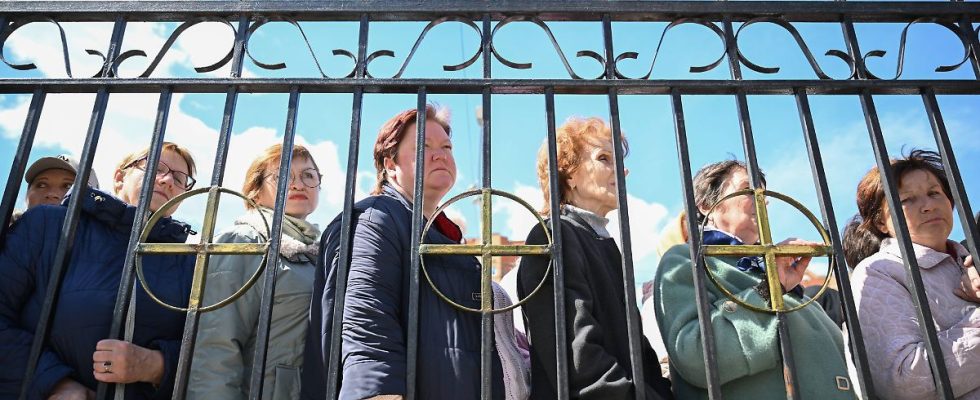The Russians seem unimpressed by the war in Ukraine and the sanctions – in fact, they are said to be doing really well. At least that is the picture drawn by Russian propaganda. But as a new study from the University of Cambridge shows, the truth is likely to be different.
Tens of thousands dead, jobs gone, jumps in inflation and Bachmut still not conquered – so what? If the Russian leadership around President Vladimir Putin wants to create an impression, then it is that none of this leaves a lasting impression. But, is this really the truth? A look at the polls doesn’t necessarily help. Because those from Russia have long had only limited credibility and there are no others. Even if the data is not manipulated, do the respondents still say what they really think? They may also distrust those who conduct polls and say what the leadership wants to hear. A well-known exercise from Soviet times.
Roberto Stefan Foa and Roula Nezi from the British University of Cambridge have tried to circumvent the problem – with data from Internet search engines, namely Google and the Russian market leader Yandex. After all, Russians are also looking online for what really interests them. This data can be evaluated and provide information on what people are concerned about – according to the study, a tried and tested method.
In the data from the search engines, the authors searched for three categories: subjective well-being, financial satisfaction and cognitive contradiction. Search terms such as “depression”, “insomnia”, “alcoholism” and “anxiety disorder” fell into the first category. Terms in the second category were “bankruptcy”, “mortgage rescheduling” or “kidney donation”. Searches were also made for “no war with Ukraine”, “protest” or the Orwell novel “1984”. The results:
- Russian polls showed war euphoria after the invasion began. In truth, the mood in the country is likely to have steadily deteriorated since the end of February 2022. The authors write that people would not have gathered around the Russian flag. By this they mean that there was no wave of patriotism after the invasion of Ukraine began a little over a year ago. The search engine data is credible in that it shows such a wave of patriotism following the 2014 annexation of Crimea.
- According to the study, the sanctions only had a limited effect on households. In the first few weeks after the start of the invasion, money shortages can be proven. The situation has stabilized since March 2022. The sanctions are likely to have reduced state revenue, but this is hardly noticeable in the broad masses. Accordingly, there is no rumbling in Russian society.
- At the beginning of the campaign and after the partial mobilization in September, the study shows large swings in dissatisfaction. The authors call this “tacit questioning”. This was shown by the fact that people searched the Internet more for terms such as “pacifism” or the names of dissidents. Since the third quarter of 2022, however, this “online contradiction” has flattened out. During this phase, mercenaries and prisoners were increasingly used in the war. After the partial mobilization, there was also an increased search for information about sleep disorders and depression.
One problem, however, is that Internet users tend to be more reserved in the last category, contradiction. You have to fear that you will also be monitored online. Such self-censorship could, in turn, affect the representativeness of the data. For this reason, obviously critical terms such as the names of well-known dissidents were not evaluated.
The deteriorating mood is also reflected in the sales figures for antidepressants. These increased by 48 percent in the first nine months of last year. Since the drugs require a prescription, it can be assumed that there are diagnoses by doctors behind them.
In terms of people’s financial happiness, it is quite surprising that the sanctions appear to have had a significant effect on households only in the first few weeks of the campaign. According to the study, however, the Corona wave in 2021 was an even heavier blow to the economy and thus to people’s wallets. Since then, the mood has steadily improved. With the beginning of the invasion, the curve did not go further up. However, the fact that it did not go down again permanently is also due to the successful containment of inflation.
According to the authors, the data shows that the Russians do not always tacitly agree with the Kremlin’s policies, but do perceive a failure of the government and think about it critically. According to the study, this could ultimately lead to greater dissatisfaction among the population. A risk for the Kremlin. If a war goes well, patriotic upheavals can erupt and the government can be strengthened. Lost wars, on the other hand, are one of the greatest risks for dictatorships. “Measuring online dissent could allow us to track this loss of legitimacy in real time.” But it doesn’t seem to be that far yet.

